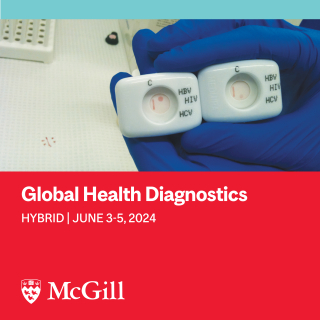
View courses by theme or by week

Hybrid. ***DATE CHANGE*** The course will be live to both the in-person and online participants approximately 9:00am-3:00pm (Montreal time) each day June 3-5, 2024. All content will be recorded and accessible to participants until July 1, 2024.
This three-day seminar on global health diagnostics will focus on cross-cutting issues (implementation, evidence, policy and guidance, cost effectiveness, data harmonization, artificial intelligence) in the infectious diseases diagnostics space, spanning antimicrobial resistance (AMR), acute febrile illnesses, neglected tropical diseases (NTDs), sexually transmitted and blood borne infections (HIV/STBBIs), TB, and Malaria.
Participants will learn from experts and stakeholders including policy makers, academics, clinicians, researchers, community advocates, program managers, product manufacturers, donors, product development partnerships, public health implementers and health leaders from high-burden countries. Attendees can expect a mix of plenary talks, engaging panel discussions and tech pitches from industry leaders.
Note May 31st: Enrollment is closed for this course.
Nitika Pant Pai, MD, MPH, PhD
Associate Professor, Division of Clinical Epidemiology, Experimental Medicine & Infectious Diseases, McGill University;
Center for Outcomes Research and Evaluation, MUHC Research Institute
Cédric Yansouni, MD, FRCPC, DTM&H
Associate Professor, Divisions of Infectious Diseases and Medical Microbiology, McGill University Health Centre;
Associate Director, J.D. MacLean Centre for Tropical and Geographic Medicine
Watch the video to hear the Drs. Pai and Yansouni discuss the course!
Faculty are still being confirmed and there may be changes to the above list.
Infectious diseases continue to pose a major threat to the health of most developing nations. The COVID-19 pandemic and emergence and spread of infections like XDR-TB, Ebola, dengue, chikungunya, and avian influenza have highlighted the importance of effective global response to epidemic threats.
Diagnosis is a critical step in effective disease care and control, but many people in developing countries do not have access to high quality diagnostic tests.
In this popular course, professionals ranging from clinicians, nurses, policy-makers, researchers, implementers, advocates and health educators gather to share their rich and diverse experiences, successes, failures and lessons learned in launching, leading, important diagnostic initiatives, globally.
This course appeals to a wide range of participants including:
Limited to 100 online participants and 100 in-person participants.